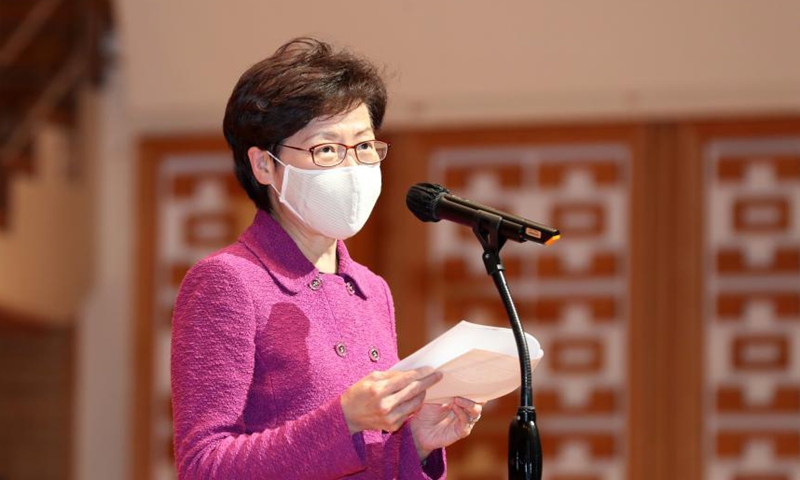Central govt supports HK as financial hub via mutual connectivity
Source: Global Times Published: 2020/11/25 14:06:33

Chief Executive of the Hong Kong Special Administrative Region (HKSAR) Carrie Lam delivered a speech at the inauguration ceremony of China Federation of Literacy and Art Circles Hong Kong Member Association in Hong Kong, south China, Nov. 18, 2020. (Xinhua/Li Gang)
China's central government has affirmed support for the Hong Kong Special Administrative Region (HKSAR)'s efforts to enhance its position as a global financial hub via deepening connectivity with the mainland's financial markets, including incorporating technology shares into stock link programs, HKSAR Chief Executive Carrie Lam said in a 2020 policy address on Wednesday.
Hong Kong's benchmark Hang Seng Index soared following Lam's speech, with an intra-day gain of 1.5 percent to 27,000 points — the highest point since February — during the morning session. It closed at 26,669.75 points, up 0.31 percent.
Lam confirmed the backing of the central government to increase the scope of qualified stocks under existing Hong Kong-mainland stock link mechanisms.
The central government has agreed to accelerate the development of stock link systems for biotech companies listed in Hong Kong that are not yet profitable, in addition to those listed on the science and technology innovation board in Shanghai.
Lam also revealed that a cross-border wealth management pro-gram will be implemented by the end of 2020. The arrangement will permit residents in Hong Kong, Macao and nine designated cities on the mainland to buy financial products in one another's markets.
Liu Guohong, director of the Shenzhen-based Department of Fi-nance and Modern Industries at the China Development Institute, said that strengthening economic ties with the mainland would help Hong Kong consolidate its role as a global financial center.
"With more investment flowing from the mainland to Hong Kong, Hong Kong's financial markets will be more reflective of China's markets and economy. This will be of great appeal to overseas investors who want to bank on China's 'development dividends'," Liu told the Global Times.
Hong Kong is seeking to strengthen cooperation with mainland financial markets at a time when its economy has been battered by the COVID-19 pandemic. The city's standing was also hit by social instability last year.
Lam's speech repeatedly addressed Hong Kong's economic cri-ses, forecasting that the region's economic output will likely con-tract by about 6.1 percent this year.
According to Liu, Hong Kong's financial markets have shuddered under external blows but signs of stabilization have emerged.
"In the past, the HKSAR has not been very proactive in cooperating with mainland financial markets, but the recent crises have prompted it to speed up such efforts. This, I think, should help Hong Kong seek new breakthroughs in financial development," he noted.
Liu also stressed that Hong Kong and the mainland have "huge scope" for further financial cooperation. For example, some financial institutions based in the mainland that have a lot of global business — like the Silk Road Fund and the Asian Infrastructure Investment Bank — could shift part of their operations to Hong Kong. Hong Kong can also help develop offshore yuan services and products.
"If Hong Kong establishes a competitive advantage in certain fi-nancial areas, such as offshore yuan businesses, plus the city's internationally compatible legal system and accounting standards, it will have no problem reinforcing its financial competitiveness," Liu noted.
RELATED ARTICLES:
- In pics: cricket bat factory in Indian-controlled Kashmir
- India bans more Chinese apps, further damping confidence of foreign investors: expert
- India isolates itself from regional growth opportunities
- Indian media hype Pangda village as in Bhutan
- Indian PM says climate change must be fought in integrated, holistic way
Posted in: ECONOMY